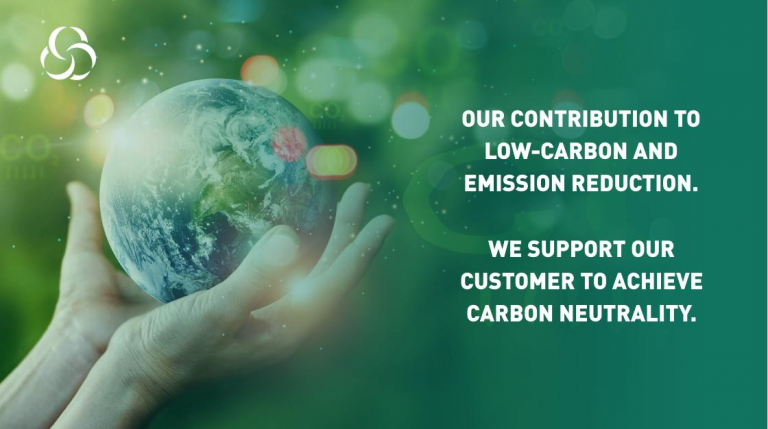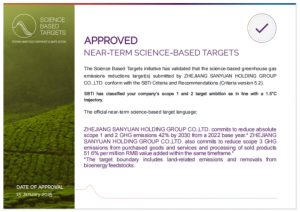Sanyuan Group achieved certification of its greenhouse gas (GHG) emission reduction targets by the Science Based Targets (SBTi) initiative recently . This significant milestone marks a significant step forward for Sanyuan Group in addressing climate change and implementing its commitment to sustainable development. It also demonstrates the Group’s unwavering commitment to working with SBTi to limit global temperature rise to 1.5°C.
The Science Based Targets (SBTi) initiative is a global initiative jointly launched by the Center for Global Environmental Information (CDP), the United Nations Global Compact (UNGC), the World Resources Institute (WRI), and the World Wildlife Fund (WWF). SBTi provides companies with a framework and tools for setting science-based targets (SBTs) and independently assesses and verifies their emission reduction targets to ensure they align with the latest climate science and contribute to achieving the goals of the Paris Agreement.
Sanyuan Group’s GHG emission reduction targets include:
Scope 1 and 2 emission reduction targets: A 42% reduction in total GHG emissions from Scope 1 (direct emissions) and Scope 2 (indirect emissions, such as purchased electricity) by 2030, using 2022 as the base year. Scope 3 Emissions Reduction Target: Using 2022 as the base year, by 2030, Scope 3 Category 1+10 emissions per 10,000 RMB profit (tCO₂e/million RMB) will be reduced by 51.6%.
To achieve this goal, Sanyuan Group will implement the following carbon reduction strategies:
1. Energy Structure Optimization: Increase the proportion of clean energy (photovoltaic and green electricity), improve energy efficiency, and reduce reliance on fossil fuels.
2. Technological Innovation and Process Upgrades: Promote the research and development and application of green and low-carbon technologies, optimize production processes, and reduce carbon emissions during production.
3. Supply Chain Management: Work closely with suppliers to promote the development of a green supply chain and reduce carbon emissions upstream and downstream.
4. Operational Cost Reduction and Efficiency Improvement: Control production costs, improve operational quality, secure new orders, and increase gross profit.
5. Green Operations and Advocacy: Promote green office and low-carbon culture within the company, and encourage employee participation in energy conservation and emission reduction initiatives. As early as 2019, Sanyuan Group established a special task force on textile and apparel sustainable development and passed a series of international environmental certifications, establishing a complete green and environmentally friendly industry chain. The approval of the group’s greenhouse gas emission reduction targets by the SBTi marks a new chapter in Sanyuan’s sustainable development strategy. This not only effectively enhances Sanyuan Group’s brand image but also provides strong support for its subsidiaries in market competition. Business teams can promote this certification as a key part of their corporate endorsement when expanding their customer base, further strengthening customer trust and recognition of Sanyuan Group’s commitment to sustainable development, thereby gaining a more advantageous position in business expansion. Going forward, we will continue to implement and promote the joint efforts of upstream and downstream supply chains to achieve science-based carbon targets and contribute to global climate action.





